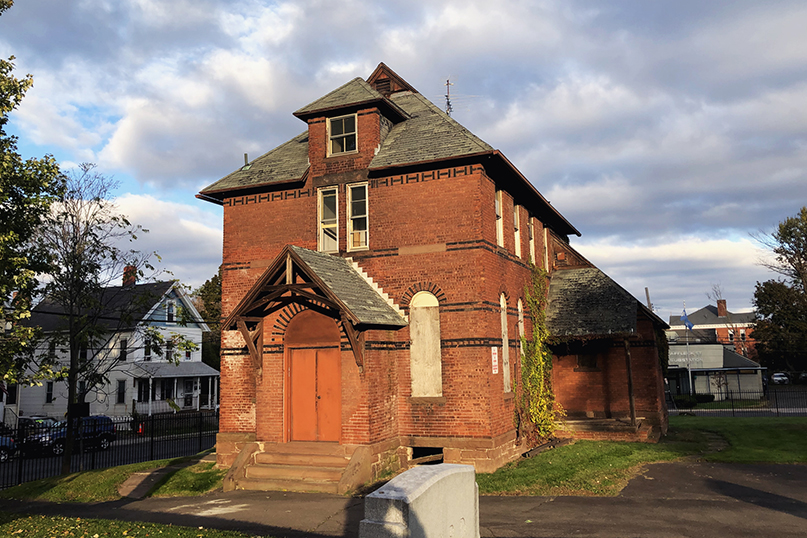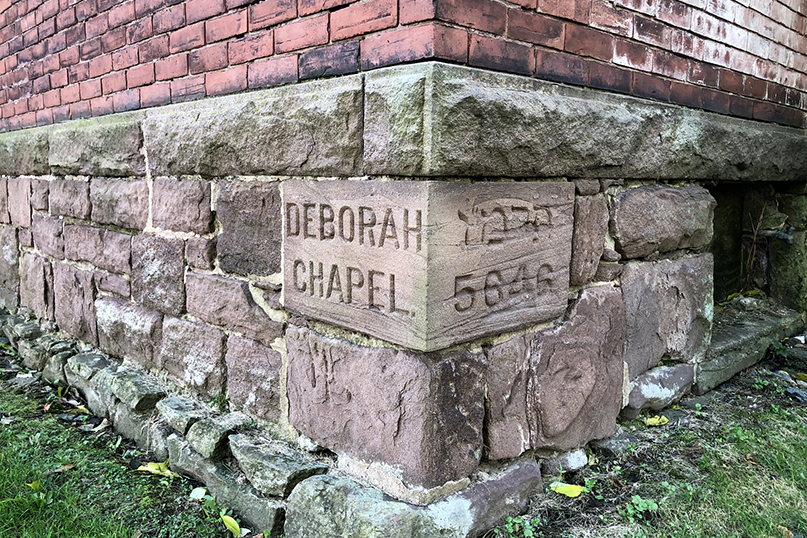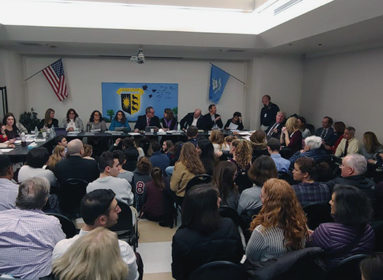
By Stacey Dresner
HARTFORD, CT – Connecticut’s Congregation Beth Israel is embroiled in a battle with historical preservationists over the fate of a 135-year-old building that sits on the Beth Israel Cemetery property on Ward Street in Hartford.
The trouble began in 2018, when the West Hartford congregation sought permission to demolish the Deborah Chapel, calling the structure “a hazard.”
When the city of Hartford denied its request, Beth Israel took the issue to the courts and this past February a judge sided with the West Hartford congregation. Now the city is appealing that decision.
Built in the 1880’s by the Deborah Society, also known as the Hebrew Ladies Benevolent Society, the three-story brick building in question was used for the Jewish ritual of “tahara” – the washing and dressing of the deceased. By the 1940s, the building was no longer used for that purpose and was used as housing for a “shamus” (caretaker). According to a statement released by the congregation, the aging building was long ago abandoned and has since fallen into disrepair.
“The building in question sits on approximately a three-acre parcel of land within the cemetery and was intended for the preparation of the dead for burial, a service now required to be performed by funeral homes,” read the statement. “For the past 70 years this building has not been in use and has deteriorated and has become a hazard. The Congregation has investigated the possibility of rehabilitating the building and found that it would cost between $500,000 and $1 million to save it.”
In early May, the National Trust for Historic Preservation included the Deborah Chapel in its annual America’s 11 Most Endangered Historic Places list.
“The Deborah Chapel, a rare and early American example of an intact Jewish funerary structure, represents the strong leadership of women within 19th-century Jewish religious and communal organizations,” said the Trust in a statement in early May.
“Congregation Beth Israel has applied for permission to demolish the structure despite its national and state historic designations. Advocates for saving it—including neighborhood residents, Jewish scholars, preservation nonprofits, the Connecticut State Historic Preservation Office, and the City of Hartford—are urging the owner to work with stakeholders to envision a new use or transfer ownership to ensure preservation.”
According to Beth Israel, the land at issue cannot be used for other purposes.
“The building is on land that was deeded to the synagogue in 1872 with a specific deed restriction that requires the property and everything that sits on it to be used solely as a cemetery. Due to the deed restriction, the house and the land on which it sits cannot be subdivided and sold or given away to be used for anything but cemetery purposes. Neither the City of Hartford nor its Historic Preservation Commission has authority to remove the deed restriction.
Dr. Samuel D. Gruber, an art and architectural historian and instructor at Syracuse University, has worked for the past 25 years in the preservation of synagogues, Jewish cemeteries and other historic sites around the world, has written about the Deborah Chapel in his blog “Samuel Gruber’s Jewish Art & Monuments.”
“The building is architecturally noteworthy and historically significant for its role in Jewish funerary tradition and as a representation of the strong role of Jewish women within the Jewish religious and communal organizations in 19th-century America. It is the second oldest surviving purpose-built Jewish building in Connecticut,” Gruber says.
Despite this and the outcry by Hartford preservations and Frog Hill neighborhood supporters of rehabilitating the building, Beth Israel, in its statement, says it has plans to make the property accessible to the congregation and to the families of the Beth Israel members who are buried in the cemetery.
“With limited space,” the statement says, “the synagogue hopes to remove this hazard and create a temporary memorial garden so that when the need for more graves arrives the congregation will be able to meet the needs of its members.”
This week, Congregation Beth Israel renewed a previous offer to the City of Hartford, its Historic Preservation Commission and anyone in the community who would like to purchase the building in their cemetery for $1, provided the purchaser removes the structure from its current location.
“We have made this offer in the past, but have never received any response,” says Scott Lewis, Chair of the Beth Israel Cemetery Committee.” Given the recent interest in the building, we thought it would be a good time to renew our offer.”
Those interested in purchasing the building for $1 and removing it may contact Tracy Mozingo, Congregation Beth Israel’s Executive Director.








 Southern New England Jewish Ledger
Southern New England Jewish Ledger















